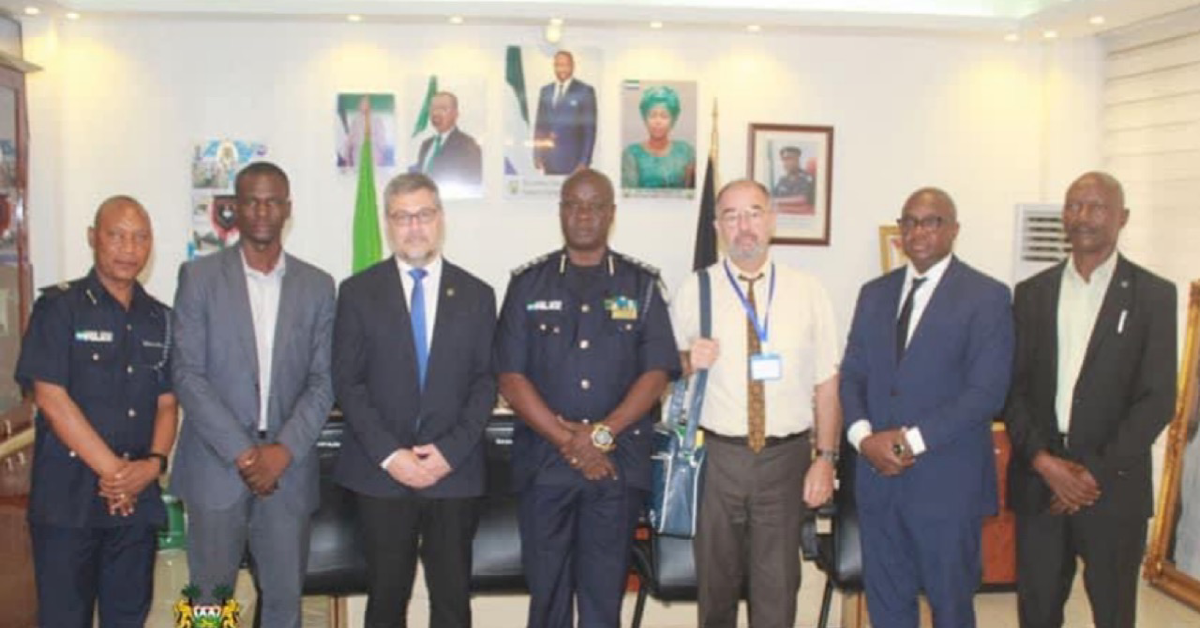An expert team representing the International Police Organization (INTERPOL) embarked on a critical mission to Sierra Leone to conduct an in-depth assessment of the Sierra Leone Police’s Fingerprint System.
This visit, which occurred on Tuesday, October 17, 2023, aimed to strengthen the country’s capabilities in the realm of crime scene investigations.
Led by Mr. Herve Raffourt, INTERPOL’s experts meticulously examined the existing Automatic Fingerprint Identification System (AFIST) of the Sierra Leone Police. Their primary objective was to identify both the strengths and weaknesses within the system, focusing on assessing the technical competence of personnel and the availability of essential equipment. The ultimate goal is to enhance the efficacy of crime scene equipment and provide necessary training.
The findings and recommendations resulting from this three-day assessment include:
Enhancing Expertise: To meet international standards, it is recommended that the Sierra Leone Police consider expanding its cadre of fingerprint experts, particularly since the current procedures rely heavily on manual crime scene examinations.
Automating Crime Scene Procedures: The introduction of an automated crime scene system, known for its speed, precision, and reliability, is suggested despite the associated costs.
Adopting Best Practices: The Sierra Leone Police is encouraged to align its crime scene management and fingerprint procedures with globally recognized best practices.
Investing in Training and Long-Term Vision: The experts emphasized the significance of continuous training and encouraged the police force to explore investments in an automated system, ensuring their long-term adherence to international standards.
In response to these critical findings, Inspector General of the Sierra Leone Police, Mr. Fayia Sellu, expressed his heartfelt appreciation for INTERPOL’s dedication and support. He underscored the importance of strengthening AFIST to effectively combat cross-border crimes and prevent criminals from exploiting system weaknesses.
Mr. Sellu also highlighted the active participation of the Sierra Leone Police in the West Africa Police Information System (WAPIS) and their ongoing efforts to train personnel across various law enforcement aspects. He emphasized the intricate connection between proficient investigations and successful prosecutions, emphasizing the importance of technical expertise in handling complex cases.
Concluding the visit, Mr. Sellu requested the INTERPOL team to compile their insights into a comprehensive report for the police force’s review and the necessary actions. He assured that the Sierra Leone Police remains steadfast in collaboration with organizations that share their vision for effective crime prevention.
In closing, Mr. Sellu extended his gratitude to the INTERPOL experts for their invaluable assistance in establishing and advancing the country’s AFIST system. He wished them a safe return to INTERPOL Headquarters in France, underscoring the significant step taken to bolster Sierra Leone’s law enforcement capabilities and align with international standards in crime scene investigations.












Sierra Leone traffic police are good at booking (collecting bribery from drivers). They should not be trained, they excel in that domain and no one can compete with them.